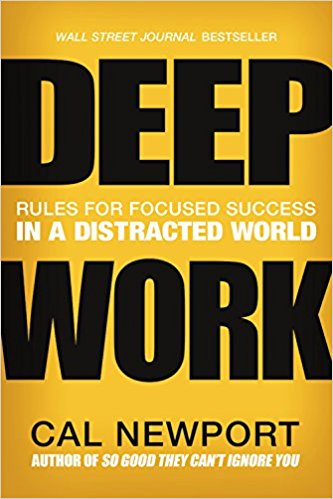
In a recent group writing retreat, I noticed that my fellow writers would sit still, their eyes focused on their laptops, busy at work. I, on the other hand, was a ball of nervous energy, getting up every ten minutes, fighting the urge to talk, check Facebook – anything but write my novel.
“I must be an undiagnosed ADHD person,” I told a friend in half jest.
But was I? Or has my brain been changed by the use of digital technology, giving me the symptoms of one with ADHD like Cal Newport seemed to suggest in his book, Deep Work?
Cal, despite being a computer scientist, doesn’t have a high opinion about social media. In fact, he thinks that the push notifications of technologies like e-mail and social media has been destructive to the human mind, eroding our ability to stay focused. It has even made us addicted to distraction.
He coins the term “shallow work”: “Non-cognitively demanding, logistical-style tasks, often performed while distracted.” These jobs are easy to replicate and don’t produce much value.
On the other hand, “deep work” will result in high-quality work, and will even give your life meaning. These tasks, usually skills obtained after many hours of study, require a deep level of focus. Deep work becoming a rare skill at a time when demand for knowledge workers is on the rise. So if you can master deep work, you’ll be at the top of your field, creating not just high quality stuff but a high production rate.
He sums it with this nifty equation: High Quality Work produced = (Time Spent) x (Intensity of Focus)
Here are some great lessons from Deep Work:
Myelin workout
When you intensely focus on doing something, you will give your neurons a good workout and rewire your brain in a good way. Deep work is a skill that needs to be cultivated, which means you need practice.
Attention residue
When you multitask, there’s a “residue” from the previous task that will diminish the attention/focus you will spend on your current task. Don’t hop from thing to thing i.e. multitask. Instead, create time blocks and do Deep Work! Intense focus during a block of time leads to great productivity.
Sacredness
The interesting side benefit of doing deep work is that life becomes more meaningful and sacred. Which is why he believes that it’s not the type of job you have that makes it meaningful, but how you do the job.
How to create deep work
1. Structure your life with routines
Because people have a limited well of willpower, doing it in an as-and-when basis will never work. Cal highlights four different styles you can adopt:
a) Monastery: Isolate and cut yourself off from all distractions like social media. You can even physically remove yourself, like sequestering yourself in a cabin in the woods to concentrate on your work.
b) Bimodal: Going back and forth between a normal life and a monastic life. I sometimes do this by going on writing retreats.
c) Rhythmic: Doing your deep work daily. For example, choosing to write every day in the morning.
d) Journalistic: You look at your weekly schedule and create time for deep work in your calendar, change it when you have to.
2. Choose a passion-filled goal
What makes you fired up? For example, I’m wildly excited about publishing my space opera, so it’s an area I’m eager to embrace deep work to make it a reality. Also, create a “cadence of accountability” ie check your progress. If you had a bad week, find out what went wrong and fix it. Met your goals? Find out how you did it, write it down, tweak it for better results and celebrate!
3. Don’t be afraid of boredom
Constantly feeding your distraction urge will only diminish your ability to focus. So the next time you’re in the LRT, don’t read on your smartphone. Gazing blankly at the scenery actually does your brain some good! In fact, use this time to engage in “productive meditation”, where you mull over the new chapter of the novel you’re writing, for example.
4. Have a shut down ritual
Designate a time at the end of the day to review every incomplete task, goal or project. Capture these thoughts in a book or app like Evernote. Cal actually ends his day with the phrase “Shut down complete”. How very computer scientist of him!
5. Internet down time
Quitting social media may be impossible for some, but evaluate how you use it and how much shallow work you’re spending on it. Choose your digital tools carefully – does it help or hinder your goals? Are the returns on investment worth it? The days of glancing at your Facebook to fill that idle minute – it’s time to ditch that in the recycling bin.
So, what do you do to fill the void? Cal suggests giving your brain a “quality alternative” to prevent yourself from falling into the lure of clickbait reads or that Instagram photo of that designer ice-cream. For example, reading a good book, learning from a podcast, or heck, just hanging out with friends.
6. Drain the shallows
What can you do to cull shallow work from your life? You’d have to decide in advance what to do with the hours you have, especially at work. Instead of fracturing your work days with spurts of one-minute e-mail checking and replying throughout the day, he suggests creating blocks of time where you are focused on one deep work task, such as editing and article or writing a press release.
All in all, Cal Newport’s Deep Work is an amazing work. It’ll benefit those who want to get more high-quality work done but not sacrifice a life worth living while doing so. Go read.
